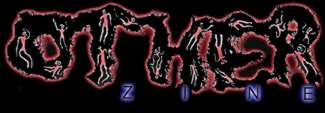
"Decline and Fall: Waiting for Damien"
by NOELL CLAYBOURNE (c/o Gregory Avery)
 It
was perhaps appropriate that I should
run into Terry O'Rourke for the first
time this century at a reception for
Damien Hirst in New York City. I was
in town to discuss the publication
of my new novel in the U.S. Terry
had just come back from mountain-climbing
in Nepal. Before that, he was covering
the Venice Film Festival for a magazine.
Terry did things like that.
It
was perhaps appropriate that I should
run into Terry O'Rourke for the first
time this century at a reception for
Damien Hirst in New York City. I was
in town to discuss the publication
of my new novel in the U.S. Terry
had just come back from mountain-climbing
in Nepal. Before that, he was covering
the Venice Film Festival for a magazine.
Terry did things like that.
There we were, standing under a huge 20-foot-tall replica of the kind of plastic anatomy cutaway that one saw in the examination room of a physician's office, with all the viscera laid open to see. Iwas standing below it---flabbergasted, of course---with a flute of (very bad) champaign dangling in one hand. Terry approached me from the starboard bow. "It's the dawning of a new era," he said, smiling.
"Well, you old Irish scalawag, what are you doing here?" Terry, I should mention, is the only Irishman I've ever met who was born and raised, through some anomaly of fate, in Hawaii. He also wore only non-colours---mostly black.
"I just got back from Nepal," Terry replied.
"How was it?"
"Very cold."
"And before that?"
"I was at the Venice Biennale."
"And how was that?"
"Very wet. What are you doing here, besides taking in the scenery?"
"My American publishers want me to cut the chapter about the baby's pram rolling downhill.""You don't say? You've finally given in to writing towards the lowest common denominator?"
"I tried that before, and it didn't work. The Americans simply don't like the idea of the baby describing what it's like to go rolling down a steep hill in a pram. They're publishing it completely uncut in the U.K., of course.""Children in peril? I thought that was on the out with the English, over there."
"Not since they re-released 'Clockwork Orange' last spring.""I remember seeing that film, but I was so distracted at the time I don't remember it very well."
"Don't worry, old boy, you didn't miss very much."
We surveyed the crowd. Everyone was waiting for Hirst to put in an appearance, which, of course, he had not done as of yet. In one corner of the gallery, a huge medicine cabinet contained thousands of pills, all hand-crafted by the artist, aligned one by one on its shelves. Shift one's gaze to the other side of the gallery, and there was a glass tank with a submerged examination chair and various species of fish swimming in the water around it. It remind me of the provocation many people experienced to Picasso's more "outré" art in the Fifties, or to the work by Jackson Pollack whose drip-painting canvases enchanted my wife, Anne, at the time. But Picasso and Pollack would not pop 'round to the local medical supply shop and buy a chair to sink into a tank of water, although
Day might have if the idea struck him.
"Has the world gone mad, or is it only us?" I asked Terry. "It's a passing thing, like the Sex Pistols," Terry replied.
"But the Sex Pistols were supposed to sound like they couldn't play their instruments."
Terry tried, and failed, to down his glass of champaign. "I've tasted mouthwash that was better than this," he said before casting his glass aside.
"We're standing here in a gallery full of absurd art, with champaign that you can't drink. By the way, how's Wim?"
Terry was supposed to be writing a screenplay for Wim Wenders' next film. "He dumped me. He's going to make the film with Sam Shepard, instead."
Well, that answered my question, I thought, although I knew it must have broken Terry's heart. He was a huge admirer of Wenders, and even had a chance to arrange a showing of the complete, uncut version of "Until the End of the World", which ran in the vicinity of 500 hours or so, so I've heard. How strange, I thought, if William Hurt, in his Armani coat and hat, and Solveig Dommartin, in her tortoise-shell sunglasses, should emerge from the crowd clamoring for the artist's arrival and begin to perambulate around the room for a turn or two. "It's the end of the world," Solveig would say, looking at the exhibits, in that sangfroid way she had in the film.
But, no, there were no miracles for sale here, this evening. Hirst still hadn't materialized, so I suggested to Terry that we get out of there and go around the corner for a decent glass of beer. He accepted. As far as I know, they're still waiting for Hirst to show up.
The next day, I read in the newspaper about the latest status of the U.S. presidential campaign while sitting in a limousine transporting me across town to the publisher's offices. The inside of the vehicle was silent, airtight and motionless. It was the end of September, and the fiascos that would occur on election night had not yet happened, but the country already felt like it was going into some sort of limbo. So was I.
(Noell Claybourne's novel "Erudite Places" will be published in the U.S. next spring. He will also be hosting a special showing of the films of Jean-Luc Godard on Britain's Channel Four.))